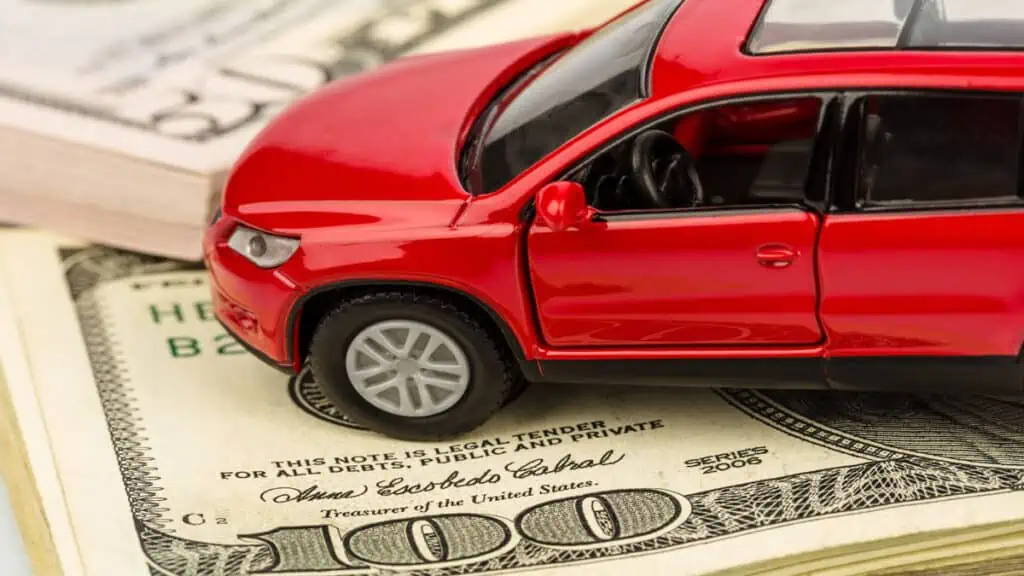THIS POST MAY CONTAIN AFFILIATE LINKS. PLEASE SEE MY DISCLOSURES. FOR MORE INFORMATION.
Many things we buy have become a victim of inflation, and cars are no exception.
The rise in both new and used car prices, along with the Federal Reserve increasing interest rates, has consumers paying sky-high monthly auto loans.
While the payments feel manageable to start, more and more Americans are realizing they cannot keep up with them month after month.
As a result, many people are looking at how to give car back.
Sadly, the process isn’t as straightforward as most would like.
But this doesn’t mean you can’t get out from under your auto loan.
Here are the best options to be free from your car payment.
KEY POINTS
Give Car Back: 10 Options To Start Over

There are a few options when you get to the point of wanting to give your car back.
Each one has its pros and cons, and sadly, very few end up without negative consequences.
Here are the best options for you to consider.
#1. Involuntary Repossession
This is the classic vehicle repossession you know and should be an absolute last resort.
You stop making payments, and eventually, the repo team comes and takes your car.
The benefit to you is you save money for a few months because you stopped making payments.
The drawback is the harassing phones from collections.
The other major downside is your credit gets ruined in the process.
This will make it nearly impossible to get another car loan any time soon, as the repossession will stay on your credit report for up to seven years.
You might even struggle to get other forms of credit.
#2. Voluntary Repossession
With voluntary surrender, you continue to pay the lender but call up the financing company and tell them you don’t want the vehicle any longer.
If they agree to voluntary repossession, they will take the financed vehicle and sell it.
You will owe the difference between the remaining balance on your car loan and the price they received.
For example, if your car loan is $30,000 and the financed car sold for $20,000, you still owe $10,000 to the lender.
Also, this gets reported on your credit reports, so your credit scores will drop, but not as much as if you choose an involuntary repo.
It’s important to note that you will almost always owe on the car loan because the finance company will sell the car at an auction, which typically gets a low price.
#3. Talk To Your Lender
Before you choose voluntary repossession of your car, consider first calling the finance company.
Tell them you are struggling financially and see what they will do.
Sometimes, the lender will allow you to miss a few monthly payments and then add them back on at the end of the loan.
Doing so will not hurt your credit history.
The key here is to not agree to the first option they suggest.
They most likely have better options, but if you choose the first thing they offer, you will never know.
Remember, finance companies don’t want to repo your car. And they don’t want to go through a collection agency.
They want the loan repaid. So it is in their best interest to work with you.
#4. Talk To The Dealer
Sometimes, the finance company won’t help or offer a solution that works for you.
When this happens, contact the dealer where you bought the car.
They might have options for you, including contacting the finance company on your behalf, assuming you financed through the dealer.
If your vehicle is in high demand, they might offer you a higher than average amount, which could pay off the car loan debt in full.
#5. Transfer Payments
An often overlooked option is transferring payments to someone else.
Here, you assign the car loan payments to your parents or a relative, and they make the monthly payment.
To make this work, you make a repayment plan with them on how you will repay them along with the loan terms.
The benefits here are substantial.
You keep the car, keep your credit, and work out better loan terms.
The downside is it could ruin your relationship, especially if you skip out on repaying and they then take the car from you.
#6. Refinance Your Loan
There are many companies out there that will refinance auto loans.
In a high-rate environment, however, it may be challenging to get a low rate, which would lower your car payments.
On the other hand, if you paid down a significant amount of your auto loan, refinancing could lower your payment, even with the same interest rate.
#7. Sell Your Car

Selling your car allows you to get out from under the loan.
The problem is, most times, you will get less for the car than what you owe, meaning you will need to come up with the difference to repay the remaining loan balance when you sign the paperwork.
For example, if you owe $25,000 and sell for $18,000, you need to have $7,000 when you transfer the title to the new owner.
To ensure you get the most money, look at the value of your vehicle using Kelley Blue Book and other auto guides.
Some people consider trading in the vehicle with the dealer when they buy another car.
But the same thing happens here. Only this time, the amount you owe gets added to your new loan.
This puts you upside down almost immediately in the new car, so most personal finance experts do not recommend doing this.
#8. Take Out A Personal Loan
Instead of selling, consider taking out a personal loan.
You can get a lower interest rate than you currently pay, and you can extend the payments out longer, making the monthly amount you owe more manageable.
The downside is if you have to extend the term too far, and you end up paying for a car you no longer own.
#9. Find Additional Income
Instead of getting rid of the car, find a way to make some extra cash on the side to put towards your car payments.
If you pay $600 a month and make $400 mowing lawns, you only have to pay $200 a month now.
While you might not want to use your free time to make extra cash, remember it is only temporary until you repay the loan.
Plus, you get to keep the car and improve your credit history.
#10. Combining Options
Nothing stops you from getting creative when it comes to solving this problem.
Maybe you know you could sell your car for $20,000, and you currently owe $25,000.
Instead of trying to pay off the loan, work a side hustle to help you pay down the $5K as quickly as possible.
Then, sell the car and pay off the loan in full.
If you still need a car, buy a reliable beater car for $5K and have a small car payment.
Or, work the side hustle to get $10K. Use half to pay down the loan and sell the car and use the other $5K to buy the replacement car.
Another scenario could be to borrow $5K from family or get a zero percent credit card balance transfer.
Use the cash to pay down the loan and then sell.
What About a Leased Vehicle?
All the information is to help you with options to return a financed car.
If you have a leased vehicle, there are other options for you.
For starters, if you no longer want to make lease payments, return the car to the dealer and pay the early termination fee.
This is less expensive than if you want to return a financed car.
Plus, doing so will not negatively affect your credit.
Frequently Asked Questions

Does giving a car back hurt your credit?
Yes, when you return a financed car through voluntary repossession, it will hurt your credit.
It won’t be as bad as if you decide to stop making payments, but it will lower your score.
Can you cancel an auto loan after signing?
Many people cite the “Cooling Off Rule” from the Federal Trade Commission that allows buyers to cancel sales contracts within three days of signing, but unfortunately, this does not apply to cars.
However, while the FTC‘s rule does not apply, some dealerships may offer such a deal. Ask before signing if they offer any such program.
Are there pre-payment fees on car loans?
Typically, you do not encounter pre-payment fees on car loan payments.
However, this is 100% true without seeing your loan agreement.
Because of this, you should refer to your loan agreement or, at the very least, call the lender and inquire.
What are some valid reasons for returning a vehicle?
There are many reasons why you might want to return a car, including not being able to afford car payments, no longer needing the vehicle, changing your mind, or the car being a lemon.
Can I return a car that is a lemon?
To protect car buyers from purchasing defective cars, states developed lemon laws, allowing the return of a vehicle if repair is not possible after four attempts.
However, it is critical to know that lemon laws vary by state, so you must ensure your issue qualifies.
Also, most lemon laws only apply to a new vehicle purchase, not a used one.
Final Thoughts
If you are considering giving your car back because you can no longer afford it, know that this isn’t a simple thing to do.
In many cases, there will be negative consequences, many times your credit being number one.
Before you consider voluntary surrender, sit down and run through your options.
The last thing you want to do is something that will benefit you now but hurt your finances later.
Usually, a creative solution is out there if you are willing to put in the work.
I have over 15 years experience in the financial services industry and 20 years investing in the stock market. I have both my undergrad and graduate degrees in Finance, and am FINRA Series 65 licensed and have a Certificate in Financial Planning.
Visit my About Me page to learn more about me and why I am your trusted personal finance expert.



